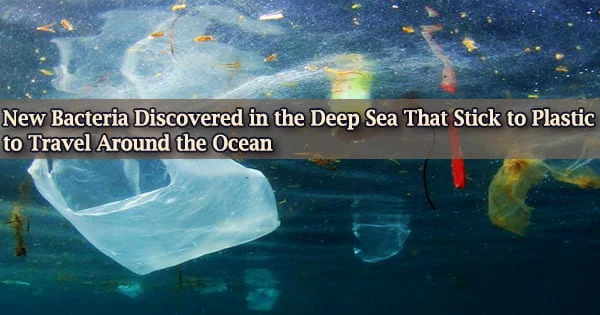Scientists from Newcastle University have discovered new species of plastic-loving bacteria in the deep water that may be able to ‘hitchhike’ throughout the ocean.
For the first time, the researchers discovered that these deep-sea, plastic-loving bacteria make up barely 1% of the whole bacterial community. The study discovered that these bacteria exclusively stick to plastic and not the non-plastic control of stone, as reported in the journal Environmental Pollution.
These bacteria may be able to ‘hitchhike’ throughout the deep sea by clinging to plastic, increasing microbial connection across seemingly isolated settings, according to the research.
The scientists employed a deep-sea ‘lander’ in the North-East Atlantic to purposely sink two forms of plastic, polyurethane, and polystyrene, in the deep (1800m) and then recover the debris to reveal a group of plastic-loving bacteria.
This method addresses the problem of how plastics, and hence our understanding of the plastisphere (microbial community connected to plastic), are sampled in the environment in order to produce consistent results.
Calorithrix, which is also found in deep-sea hydrothermal vent systems, and Spirosoma, which has been identified from Arctic permafrost, were among the bacteria discovered by the researchers.
Other bacteria found in the study included the Marine Methylotrophic Collection 3, a group of bacteria isolated from deep-sea methane seeps, and Aliivibrio, a virus that has harmed the fish farming business, underlining an increasing concern about the prevalence of plastic in the ocean.
In their most recent research, they discovered Halomonas titanicae, a strain originally recovered from the RMS Titanic. While the rust-eating microbe was first discovered on the shipwreck, researchers have discovered that it also enjoys sticking to plastic and is capable of low crystallinity plastic degradation.
The deep sea is the largest ecosystem on earth and likely a final sink for the vast majority of plastic that enters the marine environment, but it is a challenging place to study. Combining deep-sea experts, engineers, and marine microbiologists, our team is helping to elucidate the bacterial community that can to stick to plastic to reveal the final fate of deep-sea plastic.
Max Kelly
Max Kelly, a Ph.D. student at Newcastle University’s School of Natural and Environmental Sciences, led the study.
He said: “The deep sea is the largest ecosystem on earth and likely a final sink for the vast majority of plastic that enters the marine environment, but it is a challenging place to study. Combining deep-sea experts, engineers, and marine microbiologists, our team is helping to elucidate the bacterial community that can to stick to plastic to reveal the final fate of deep-sea plastic.”
Microplastics (fragments with a diameter of less than 5mm) account for 90% of the plastic waste found at the ocean’s surface, indicating that the amount of plastic entering our ocean is substantially more than estimates of floating plastic on the ocean’s surface.
Although the plastic-loving bacteria discovered in this study constitute a small portion of the community colonizing plastic, they emphasize the growing ecological consequences of plastic pollution.





